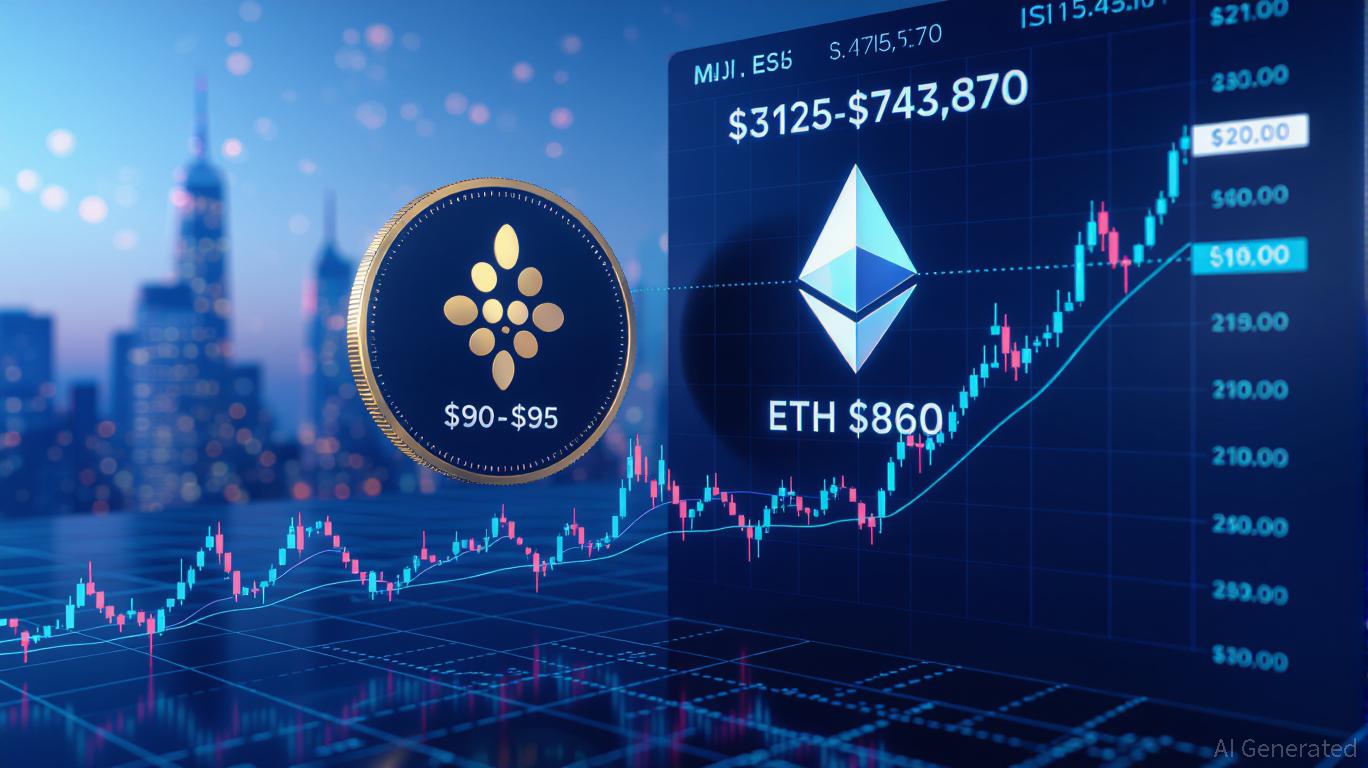The Institutionalization of AI-Driven Finance: JPMorgan’s $500M Bet on Numerai and the Rise of Decentralized Quant Strategies
- JPMorgan invests $500M in Numerai, a decentralized AI hedge fund, signaling institutional adoption of crypto-native strategies. - Numerai's model crowdsources global data scientists via blockchain incentives, achieving 25.45% net returns in 2024 with low fees. - The investment doubles Numerai's AUM to $1B, validating scalable, cost-efficient AI-driven finance as traditional models struggle with agility. - NMR token surged 38% post-investment, highlighting token economics' role in institutionalizing decen
The financial landscape is undergoing a seismic shift as institutional capital increasingly allocates to AI-driven, decentralized strategies. JPMorgan’s $500 million investment in Numerai, a San Francisco-based hedge fund, marks a pivotal moment in this evolution. By backing a firm that leverages a global network of data scientists and blockchain-based incentives, JPMorgan is not merely diversifying its portfolio—it is signaling a broader acceptance of next-generation asset management models. This move underscores a strategic pivot toward scalable, cost-efficient, and high-conviction strategies that challenge traditional paradigms.
The Numerai Model: Decentralization Meets Machine Learning
Numerai’s approach diverges sharply from conventional hedge funds. Instead of relying on in-house teams of quants, it crowdsources trading signals from a decentralized network of data scientists who submit models via an open API. Contributors stake Numeraire (NMR) tokens to validate their predictions, aligning their incentives with fund performance [1]. This model democratizes access to quantitative finance while harnessing the diversity of machine learning techniques—from tree ensembles to transformers—to generate alpha [2].
The results speak for themselves. In 2024, Numerai delivered a 25.45% net return with a Sharpe ratio of 2.75, outperforming most traditional funds [3]. Its fee structure—1% management and 20% incentive—further enhances its appeal, offering investors a cost-efficient alternative to legacy models [4]. The firm’s success is amplified by token economics: NMR’s price surged 38% following JPMorgan’s investment, driven by buybacks and staking rewards that reduce supply and increase scarcity [5].
Strategic Rationale: Why JPMorgan Invested
JPMorgan’s decision to allocate $500 million to Numerai reflects a calculated bet on the convergence of AI and institutional finance. The investment doubles Numerai’s assets under management (AUM) to nearly $1 billion, validating its ability to scale without compromising performance [6]. For JPMorgan, this aligns with a broader strategy to access high-Sharpe strategies in a volatile market. Traditional quant funds, constrained by rigid structures and high operational costs, struggle to adapt to rapidly shifting conditions. Numerai’s decentralized model, by contrast, offers agility and resilience, traits that are increasingly critical in today’s environment [7].
Moreover, the investment positions JPMorgan at the forefront of a financial revolution. By embracing a crypto-native asset (NMR) and a decentralized governance framework, the bank is signaling its commitment to innovation. This move also reflects a growing institutional appetite for tokenized assets and AI-driven analytics, trends that are reshaping asset management [8].
Implications for the Future of Asset Management
Numerai’s rise is emblematic of a larger shift. Institutional investors are no longer confined to traditional strategies; they are now exploring decentralized, AI-powered alternatives that offer superior risk-adjusted returns. The JPMorgan-Numerai partnership exemplifies this trend, demonstrating that institutional-grade performance can emerge from unconventional models.
However, challenges remain. Regulatory scrutiny of tokenized assets and AI-driven strategies could slow adoption. Yet, as Numerai’s success shows, the benefits—transparency, scalability, and cost efficiency—may outweigh these risks. For forward-thinking investors, the message is clear: the next-generation asset management paradigm is not a distant future—it is here.
Conclusion
JPMorgan’s $500 million investment in Numerai is more than a financial transaction; it is a strategic endorsement of a new era in finance. By allocating capital to a decentralized, AI-driven hedge fund, the bank is redefining what institutional-grade performance looks like. As the industry grapples with the implications of this shift, one thing is certain: the institutionalization of AI-driven finance is accelerating, and those who adapt will lead the charge.
Source:
[1] JPMorgan Secures $500m Capacity in Numerai
[2] Quant hedge fund Numerai secures $500m JPMorgan allocation
[3] The AI-Crypto Convergence: Why JPMorgan's $500M Bet ...
[4] Institutional Validation of AI-Driven, Crypto-Integrated ...
[5] NMR Crypto Latest News: Price Doubles as JPMorgan ...
[6] JPMorgan Asset Management has invested $500 million in Numerai
[7] JPMorgan Bets Big on AI's New Frontier in Finance
Disclaimer: The content of this article solely reflects the author's opinion and does not represent the platform in any capacity. This article is not intended to serve as a reference for making investment decisions.
You may also like
BlockDAG: Why It Outperforms 2025’s Hottest Crypto Presales in Scalability, ROI, and Ecosystem Adoption
- BlockDAG (BDAG) dominates 2025 crypto presales with 15,000 TPS hybrid DAG-PoW architecture, outperforming Solana and Ethereum. - $386M presale at $0.03/token projects 3,632% ROI, supported by 50B token cap, 2.5M mobile miners, and institutional audits. - Strategic partnerships with Inter Milan, Borussia Dortmund, and 4,500+ EVM developers differentiate BDAG's ecosystem from speculative rivals. - Competitors like MAGAX and LYNO face scalability risks and niche limitations, while BDAG's 20 exchange listing

Blockchain Data Infrastructure: Strategic Partnerships Fueling Institutional Adoption in 2025
- U.S. government anchors GDP data on Ethereum/Solana via Chainlink oracles, transforming macroeconomic metrics into programmable assets for DeFi and automated trading. - Enterprise blockchain partnerships (Alibaba Cloud, Walmart, De Beers) optimize supply chains and healthcare systems, achieving 50% cost reductions and real-time traceability via Hyperledger and KSI tech. - $59M Deploying American Blockchains Act accelerates institutional adoption, with Ethereum ETFs hitting $27.6B AUM and blockchain infra

Cardano (ADA) and Ethereum (ETH): Critical Resistance Breakouts and Institutional Catalysts for a New Bull Cycle
- Cardano (ADA) and Ethereum (ETH) face critical resistance levels amid 2025 bull cycle momentum, driven by technical breakouts and institutional adoption. - ADA’s $0.90–$0.95 range sees whale accumulation (10.3% supply) and ETF approval odds at 83%, while ETH’s $3,860+ breakout aligns with $13.3B ETF inflows. - Regulatory clarity (ADA as commodity) and Ethereum’s RWA dominance (50% market share) reinforce institutional confidence, though SEC ETF decisions pose fragmentation risks.

U.S. Department of Commerce "On-Chain": Oracles Are Taking Off
